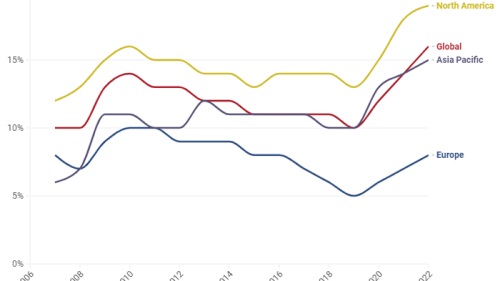Unless federal lawmakers put aside partisanship, the nation will “face the most predictable economic crisis in history, and also one of the most avoidable,” according to Urban Land Institute Spring Meeting keynote speaker Erskine B. Bowles. Closing out the meeting’s opening day at the Charlotte, N.C., Convention Center, the former co-chairman of Obama’s National Commission on Fiscal Responsibility and Reform cautioned attendees, “The fiscal path this nation is on (with a deficit of $1 trillion and rising) is simply not sustainable. Big deficits are like cancer, and they are going to destroy us from within.”
Bowles, who had a leading role in reducing the federal deficit in 1996 during the Clinton administration, said the world has “changed dramatically from a fiscal standpoint” from that time, making the challenge ever more daunting. He cited four main causes:
- Healthcare costs – The U.S. spent 10 percent of its budget on healthcare in 1981; currently, that amount is 25 percent, and by 2021, it will be close to 33 percent. Despite spending twice as much on healthcare as any other developed country, the U.S. remains in the mid-range among the world’s nations for life expectancy and infant mortality.
- Defense spending – The U.S. spends more than the next 15 largest nations, including China and Russia, on defense programs. “America is bearing a disproportionate responsibility for world peace…the biggest threat to national security is not terrorists, but deficits eating up our resources.”
- The U.S. tax code – “Our tax code is inefficient, ineffective, and globally anti-competitive.” He said one solution is to broaden the tax base and simplify it (with lower rates for individuals and corporations), and use 92 percent of the resulting revenue to lower income tax rates and 8 percent to reduce the deficit. The result, Bowles said, would be dynamic economic growth and a lower overall deficit.
- Compound interest – Currently, the U.S. spends $250 billion per year on interest on the national debt. While this is already higher than the combined expenditures for several federal departments (Commerce, Education, Energy, Homeland Security, Interior, Justice and State), this figure could rise to $1 trillion as spending and borrowing continue unchecked. ($1 trillion is nearly as much as the U.S. takes in annually as revenue.) “That’s a trillion we can’t spend to educate our kids, that we can’t spend on infrastructure to move goods and services, and that we can’t spend on high-value research,” Bowles said.
To address these issues, the commission proposed a plan to reduce the deficit by $4 trillion over the next decade, which Bowles said was the minimum amount needed to stabilize the debt and reduce it as a percentage of the gross domestic product. With bi-partisan support, the plan included domestic spending cuts, defense cuts, and tax code changes, but it stalled in Congress.
“Our generation of politicians has got to stop kicking the can down the road,” Bowles said. “We don’t have the luxury of time to get the next generation to fix the problem. If we make tough choices and get our fiscal house in order, America can compete with the best and brightest in the world. But I’m equally confident that if we don’t, this country is on its way to being a second-rate power.”
Bowles urged ULI members to demand that their politicians make tough choices and discuss in detail how they will solve long-term fiscal problems. “Do it for your grandkids, your kids, yourselves, and your country,” he said.




